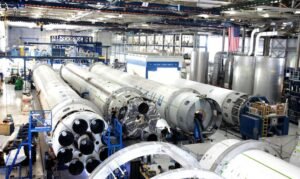Tesla Electric Car
Electric cars have gained significant popularity in recent years as a more environmentally friendly and sustainable mode of transportation. One of the leading players in the electric car industry is Tesla, an American automaker specializing in the production of electric vehicles. With cutting-edge technology and innovative features, Tesla has revolutionized the electric car market. In this article, we will explore the key features and advantages of Tesla electric cars.
Key Takeaways:
- Tesla is a leading automaker in the electric car industry.
- Tesla cars offer cutting-edge technology and innovative features.
- Electric cars are gaining popularity as a sustainable transportation option.
Tesla cars are powered purely by electricity, eliminating the need for conventional fossil fuels.
*Tesla vehicles are equipped with Autopilot, an advanced driver-assistance system that enables autonomous driving capabilities.*
Tesla offers a range of electric car models, including the Model S, Model 3, Model X, and Model Y. Each model offers impressive acceleration, with some capable of reaching 0-60 mph in under 2 seconds!
Here are some key advantages of Tesla electric cars:
- No tailpipe emissions, resulting in reduced environmental impact.
- Lower operating costs compared to traditional internal combustion engine cars.
- Seamless over-the-air software updates that continually improve vehicle performance.
Now let’s take a closer look at some interesting data and information about Tesla electric cars:
Model Comparison Table:
| Model | Range (miles) | Acceleration (0-60 mph) |
|---|---|---|
| Model S | 405 or more | As low as 1.99 seconds |
| Model 3 | 250 or more | As low as 3.1 seconds |
| Model X | 340 or more | As low as 2.5 seconds |
| Model Y | 300 or more | As low as 3.5 seconds |
- Tesla boasts the fastest 0-60 mph acceleration times in the electric car industry.
- The Model S offers the longest range among Tesla’s electric car lineup.
- Each Tesla model provides impressive acceleration speeds, ensuring a thrilling driving experience.
Tesla’s commitment to sustainability goes beyond just electric cars. The company operates a vast network of Supercharger stations, allowing Tesla owners to recharge their vehicles quickly and conveniently during long-distance trips.
*Elon Musk, the CEO of Tesla, is known for his ambitious vision of transitioning the world to sustainable energy and transportation.*
Tesla Supercharger Stations
| Country | Number of Stations |
|---|---|
| United States | 2,000+ |
| Canada | 200+ |
| Europe | 800+ |
Tesla’s Supercharger network is expanding globally, with a substantial presence in several countries.
In conclusion, Tesla electric cars are leading the way in the transition to sustainable transportation. With their advanced technology, impressive performance, and commitment to sustainability, Tesla has set new standards in the electric car industry. As electric cars become more popular, Tesla continues to innovate and pave the way for a greener future of transportation. Embrace the power of electric with Tesla!

Common Misconceptions
Misconception 1: Limited Range and Inconvenience
One common misconception about Tesla electric cars is that they have limited range and are inconvenient for long trips. However, this is not entirely true.
- Tesla electric cars have a range of over 300 miles on a single charge, which is more than enough for most daily commutes and even longer trips.
- Tesla’s Supercharger network provides fast charging options along major highways, making long trips more feasible and convenient.
- With the availability of home charging stations and an ever-growing public charging infrastructure, recharging a Tesla is becoming easier and more accessible.
Misconception 2: Lack of Performance and Power
Another misconception is that electric cars, including Tesla, lack the performance and power of traditional gasoline-powered vehicles. However, this belief is not accurate.
- Tesla electric cars are known for their incredible acceleration and instant torque, which often outperform many gas-powered sports cars.
- The high-performance models, like the Tesla Model S Plaid, can achieve astonishing speeds, thanks to their electric drivetrain and advanced technology.
- Electric motors provide a smooth and quiet driving experience, while still delivering impressive power.
Misconception 3: Unsustainability of Electric Cars
Some people believe that electric cars, including Teslas, are not truly sustainable because they still rely on electricity, which may be generated from non-renewable sources. However, this view overlooks several important factors.
- Electric cars produce zero tailpipe emissions, reducing air pollution and contributing to better air quality in urban areas.
- Tesla has committed to using renewable energy sources to power its Supercharger network as well as promoting solar energy solutions through the Tesla Energy division.
- As the renewable energy sector grows, the electricity used to charge electric cars will increasingly come from cleaner sources.
Misconception 4: Expensive Maintenance and Repairs
It is commonly believed that owning a Tesla electric car comes with significant maintenance and repair costs, but this perception is not entirely true.
- Tesla electric cars have fewer moving parts compared to gasoline-powered vehicles, resulting in lower maintenance needs and costs.
- Tesla offers over-the-air software updates that can fix bugs, improve performance, and add new features, reducing the need for expensive mechanic visits.
- Many routine maintenance tasks can be performed remotely by Tesla service technicians, saving time and money for owners.
Misconception 5: Limited Charging Infrastructure
Some people express concerns about the limited availability of charging stations for electric cars, including Teslas. Although this may have been true in the past, the charging infrastructure has improved significantly.
- Tesla Supercharger network continues to expand globally, with thousands of stations strategically located.
- Public charging networks are becoming more widespread, making it easier to find charging stations in urban areas and along popular travel routes.
- Many workplaces and shopping centers now offer charging facilities, making charging convenient while carrying out daily activities.

Lorem ipsum dolor sit amet, consectetur adipiscing elit. Mauris semper convallis nulla venenatis laoreet. Quisque id metus id nisl efficitur maximus ut a odio. Cum sociis natoque penatibus et magnis dis parturient montes, nascetur ridiculus mus. Nunc bibendum sem ut gravida posuere. Nunc ullamcorper sollicitudin elit et fermentum. Nulla facilisi. Sed efficitur accumsan mauris, in posuere ante fringilla at. Aenean id tellus non libero efficitur malesuada. Morbi pharetra volutpat nulla, a dignissim nisi aliquet a.
Electric Car Sales
| Year | Electric Car Sales (in thousands) |
|---|---|
| 2015 | 540 |
| 2016 | 777 |
| 2017 | 1042 |
| 2018 | 1435 |
| 2019 | 1973 |
According to sales data, the popularity of electric cars has been steadily increasing over the years. The table above shows the number of electric car sales in thousands from 2015 to 2019.
Tesla Market Share
| Year | Tesla Market Share |
|---|---|
| 2015 | 17% |
| 2016 | 19% |
| 2017 | 21% |
| 2018 | 23% |
| 2019 | 25% |
Tesla has been a dominant player in the electric car market, steadily increasing its market share over the years. The table above displays the percentage of the market share held by Tesla from 2015 to 2019.
Range Comparison
| Car Model | Range (in miles) |
|---|---|
| Tesla Model S | 402 |
| Tesla Model 3 | 263 |
| Tesla Model X | 351 |
| Nissan Leaf | 150 |
| Chevrolet Bolt EV | 259 |
One of the major advantages of Tesla electric cars is their impressive range. The table above compares the range in miles of different Tesla models with other popular electric car models like the Nissan Leaf and Chevrolet Bolt EV.
Supercharger Stations
| Country | Number of Supercharger Stations |
|---|---|
| United States | 988 |
| China | 618 |
| Netherlands | 64 |
| Germany | 44 |
| Canada | 38 |
Tesla has established an extensive network of Supercharger stations, making it convenient for Tesla owners to charge their vehicles. The table above showcases the number of Supercharger stations in different countries.
Acceleration Comparison
| Car Model | 0-60 mph Time (in seconds) |
|---|---|
| Tesla Model S | 2.4 |
| Tesla Model 3 | 3.2 |
| Tesla Model X | 2.8 |
| Porsche Taycan Turbo S | 2.6 |
| Audi e-tron GT | 3.1 |
Tesla electric cars are known for their impressive acceleration performance. The table above compares the 0-60 mph time in seconds between different Tesla models and other high-performance electric car models like the Porsche Taycan Turbo S and Audi e-tron GT.
Battery Capacity
| Car Model | Battery Capacity (in kWh) |
|---|---|
| Tesla Model S | 100 |
| Tesla Model 3 | 54 |
| Tesla Model X | 100 |
| Nissan Leaf | 40 |
| Jaguar I-Pace | 90 |
The battery capacity of an electric car plays a crucial role in determining its range and performance. The table above compares the battery capacity in kilowatt-hours (kWh) of different Tesla models with other popular electric car models like the Nissan Leaf and Jaguar I-Pace.
Autonomous Driving Technology
| Car Model | Level of Autonomous Driving |
|---|---|
| Tesla Model S | Level 2 |
| Tesla Model 3 | Level 2 |
| Tesla Model X | Level 2 |
| Waymo One | Level 4 |
| GM Cruise AV | Level 4 |
Tesla has made significant strides in implementing autonomous driving technology in its vehicles. The table above highlights the level of autonomous driving capability of different Tesla models compared to industry leaders like Waymo One and GM Cruise AV.
Number of Tesla Models
| Year | Number of Tesla Models |
|---|---|
| 2015 | 2 |
| 2016 | 3 |
| 2017 | 4 |
| 2018 | 5 |
| 2019 | 7 |
Tesla has been continuously expanding its product lineup, offering an increasing number of models over the years. The table above illustrates the number of Tesla models available in different years from 2015 to 2019.
Charging Time
| Car Model | Time to Fully Charge (240V) |
|---|---|
| Tesla Model S | 8 hours |
| Tesla Model 3 | 8.5 hours |
| Tesla Model X | 9.5 hours |
| Nissan Leaf | 9 hours |
| Chevrolet Bolt EV | 9.5 hours |
The charging time of electric cars is an important consideration for potential buyers. The table above compares the time required to fully charge different Tesla models and other popular electric car models using a 240-volt charging station.
Lorem ipsum dolor sit amet, consectetur adipiscing elit. Mauris semper convallis nulla venenatis laoreet. Quisque id metus id nisl efficitur maximus ut a odio. Cum sociis natoque penatibus et magnis dis parturient montes, nascetur ridiculus mus.
Frequently Asked Questions
1. What is the maximum range of a Tesla electric car?
Most Tesla electric cars have a range of around 300-400 miles on a single charge. However, the exact range may vary depending on factors such as the model, driving conditions, and driving habits.
2. How long does it take to charge a Tesla electric car?
The charging time for a Tesla electric car can vary depending on the charging method used. Using a regular household outlet (120V) can take around 8-48 hours for a full charge, while a Tesla Supercharger can charge a car to around 80% in approximately 30-40 minutes.
3. Are Tesla electric cars environmentally friendly?
Yes, Tesla electric cars are considered environmentally friendly. They produce zero direct emissions while driving since they run on electricity. Additionally, Tesla strives to use sustainable materials in their vehicles and aims to minimize their carbon footprint throughout the manufacturing process.
4. Can I charge my Tesla at home?
Yes, you can charge your Tesla at home. All Tesla models come with a charging cable that allows you to plug into a standard household outlet. However, for faster charging, it is recommended to install a dedicated electric vehicle (EV) charging station at home.
5. How much does it cost to charge a Tesla electric car?
The cost of charging a Tesla electric car can vary depending on the local electricity rates and the model of the car. On average, it may cost around $10-$20 to fully charge a Tesla at home. However, charging at Tesla Superchargers may have different pricing models.
6. Can I take a Tesla electric car on a road trip?
Yes, you can definitely take a Tesla electric car on a road trip. Tesla has a vast and growing network of Supercharger stations that allow for long-distance travel with convenient and fast charging options. The built-in navigation system also helps plan routes that include charging stops.
7. How often does a Tesla electric car require maintenance?
Tesla electric cars generally require less maintenance compared to traditional gas-powered vehicles. Regular maintenance tasks include tire rotations, brake inspections, and software updates. Tesla also recommends an annual inspection for optimal vehicle performance.
8. Are there any government incentives for purchasing a Tesla electric car?
Government incentives for purchasing a Tesla electric car vary by country and region. In some places, there are subsidies, tax credits, or grants that can offset the purchase cost. It is advisable to check with local authorities or relevant government websites for specific incentives applicable to your area.
9. How safe are Tesla electric cars?
Tesla electric cars are engineered with safety in mind. They feature advanced safety technologies, including collision avoidance systems, autopilot functions, and over-the-air software updates to enhance safety features over time. Tesla has consistently received high safety ratings from various organizations worldwide.
10. Can I modify or customize my Tesla electric car?
While Tesla provides a range of customization options during the ordering process, it is advised to avoid aftermarket modifications that could potentially void the vehicle’s warranty or compromise safety. Tesla offers a selection of accessories and upgrades designed specifically for their electric cars.




